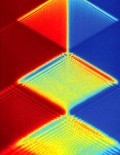Spliced feed for The Science Network |
| Protect Your Family from Colds and Flu [SciScoop Science Blog] Posted: It can't be that season already, what happened to the summer..? But a press release just into the SciScoop corporate offices suggest that the rather than the season of mists and mellow fruitfulness being upon us once more, it's the season of coughs and yellow snottiness. So, what can you do to protect your family from colds and flu? |
| Spectral Analysis [Sciencebase Science Blog] Posted: 24 Sep 2008 07:00 AM CDT
Doping the superbugs - Substances found in cannabis could be used to fight potentially lethal superbugs, such as antibiotic-resistant bacteria, without the mood-altering effects, according to researchers in Italy and the UK. Cannabis sativa (L. Cannabinaceae) extracts may also provide an alternative to synthetic antibacterial substances used in personal hygiene products, including hand wash and cosmetics. Diamond amp - A new spectroscopic approach to measuring the energy levels of an atomic system has been developed by US researchers. Amplitude spectroscopy can be used to measure the energies of certain natural and artificial atoms and molecules over extremely broad bandwidth by scanning the amplitude of the applied radiation rather than its frequency. The new technique allows the characterization of multiple energy levels in the system, and so overcomes a key challenge to realization of powerful quantum computers. It is applicable to systems with strong coupling to external fields, including artificial atoms, spin systems, cold atoms and molecules, and molecular magnets. Littlest test-tube - Chemists in Japan have synthesized a new porous material that acts as a microscopic solid-state reaction vessel. Chemical changes taking place in each pore can be tracked using X-ray crystallography the team explains. Testing times for biomass - Spectroscopy can be used to determine the amount of ash and char present in various types of biomass derived from wood, according to researchers in Japan and the US. Their analytical approach could help in the development of renewable resources for fuels to replace fossil fuels. |
| Baby-killing ant nannies rebel against captors [Earth & Sky Podcast] Posted: 24 Sep 2008 04:09 AM CDT Kidnapped and enslaved ant ‘nannies’ might be rebelling against their ant captors, according to biologist Susanne Foitzik of Munich, Germany. This posting includes an audio/video/photo media file: Download Now |
| Posted: 23 Sep 2008 10:52 AM CDT This week, Skepticality rounds out its Dragon*Con coverage withÂthe Skeptrack panel inspired byÂJunior Skeptic EditorÂDaniel Loxton'sÂop-ed essay, "Where Do We Go From Here?"Â Daniel also joins Swoopy to share his thoughts upon hearing the panel discussion, and about skeptical trends. Panelists for this conversation about the future of skeptical activism include theÂJREF's James Randi and Jeff Wagg, Skeptical musician George Hrab, The Secular Coalition for America's Lori Lipman Brown , Center forÂInquiry's D.J. Grothe and Benjamin Radford, Australian skeptic Dr. KarenÂStollznow â and by popular demand, new JREF president Dr. Phil Plait. This posting includes an audio/video/photo media file: Download Now |
| You are subscribed to email updates from The Science Network To stop receiving these emails, you may unsubscribe now. | Email Delivery powered by FeedBurner |
| Inbox too full? | |
| If you prefer to unsubscribe via postal mail, write to: The Science Network, c/o FeedBurner, 20 W Kinzie, 9th Floor, Chicago IL USA 60610 | |
 This week in my SpectroscopyNOW column, I have four new posts covering, as usual, a wide range of solutions to scientific and technical problems. First up, is the discovery that compounds found in cannabis could lead to novel antibiotics that are less susceptible to resistance than conventional drugs. Then, we have a new type of spectroscopy that allows scientists to carry out broadband analysis of artificial atoms held at temperatures close to absolute zero. Next, is word from chemists that they have developed a new type of reaction flask that can carry out reactions in the solid state. Finally, this week, we hear of testing times for biomass, where modern spectral analysis could help in the processing of old, treated wood as a renewable fuel resource.
This week in my SpectroscopyNOW column, I have four new posts covering, as usual, a wide range of solutions to scientific and technical problems. First up, is the discovery that compounds found in cannabis could lead to novel antibiotics that are less susceptible to resistance than conventional drugs. Then, we have a new type of spectroscopy that allows scientists to carry out broadband analysis of artificial atoms held at temperatures close to absolute zero. Next, is word from chemists that they have developed a new type of reaction flask that can carry out reactions in the solid state. Finally, this week, we hear of testing times for biomass, where modern spectral analysis could help in the processing of old, treated wood as a renewable fuel resource.
No comments:
Post a Comment